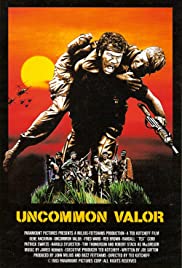
UNCOMMON VALOUR
US, 1983, 100 minutes, Colour.
Gene Hackman, Robert Stack, Fred Ward, Reb Brown, Patrick Swayze.
Directed by Ted Kotcheff.
Uncommon Valour is a film about memories of the Vietnam war. Groups of Americans made headlines in the early '80s in trying to enter Laos or Kampuchea to rescue American soldiers, missing in action, allegedly in camps there since the '70s. This film shows Gene Hackman as a bereaved father, rounding up and re-training veterans from Vietnam for such a mission. (Echoes of The Dirty Dozen.) It is rehearsed; it goes into action.
The film was directed by Ted Kotcheff who has made many action films including Wake In Fright and the first Rambo film, First Blood. This is a tough military film, not pulling its punches in reaction to the war and its aftermath. However, it was not nearly as popular as First Blood. Ultimately the imitations of Uncommon Valour were made - a Chuck Norris action film, Missing in Action and, of course, Rambo First Blood II which resembles this film in its plot. Critics were not always favourable to these films - seeing them as too jingoistic and supportive of exaggerated Right-Wing? military and political attitudes.
1. Entertaining and interesting action adventure? Topical material? American and Vietnam social issues?
2. The American atmosphere of the 80s: memories of Vietnam, attitudes towards the war, towards the veterans, towards those missing in action? The film's use of Thai locations and atmosphere? The contrasts and comparisons of the United States and Asia?
3. The structure of the film: attempts at rescuing the M.I.As, the plane, the recruiting, the training and the rehearsing, the setbacks, the reality, adapting to the situation - and the emotional ending? Audience interest and involvement? In understanding, emotional?
4. The title and its military tone, the war and its re-assessment, the experience of the war, camaraderie, soldiers helping one another, the experience of the imprisonment, the heroism and stands? Families and their anxiety about missing relatives?
5. Gene Hackman as the father, his own experience of war, his beliefs, his long years attempting to interest politicians in the M.I.As, his failures, his reconnaissance of the situations in Vietnam and Laos? The reaction of the American officials? Bugging his phone? The Senator ignoring him? His frustrations, emotional reaction? His relationship with his wife, their common anxiety and grief? The dreams and memories of his son? His plan? Friendship with Hugh McGregor?
6. The recruiting: the glimpse of each in their work - beach boy, tutor, racing expert, hospital administrator etc.? Their experiences, memories? Their keeping in touch with each other or not? The pressure by Jason Rhodes? Their decisions to go? The women and their influence? The background of the prologue, the combat, the rescue, Frank Rhodes staying behind, the helicopters and the take-off, the explosions, the Viet Cong capturing them?
7. Hugh Mc Gregor and his money, the backing, his son? Political connections? Phone-tappings? (The factual background of such attempts being financed in the early '80s?)
8. Rhodes and his relentlessness, the pressure on the veterans, his tough attitudes towards them, his establishing the elaborate replica of the camp, the bases on the reconnaissance photos, the training, live ammunition? Comradeship with the men, his expectations? The details of the rehearsal and training? Scott and his role in training - his severity, the next generation, the revelation of his father being an M.I.A.? The transfer to Thailand? The thwarting of the plans by the administration? The failure, the photos, the deals? The buying of Black Market arms? The trip into Laos? The contact with the drug guide and his daughters? The execution of the plan - his part in the heroics, the timing, the finding of the men, the return - and his standing aside with his wife with the news that his son was dead?
9. Scott and the younger generation: tough, his work with the group, lacking experience in Vietnam, the letter of the law, the clash? His mellowing? His participation on the mission?
10. Wilkes and his statuary, his wife, the loner, motivation, character, his experiences, especially the tunnel memories, his skill with the explosions?
11. Blaster and the bikes, his bonds with the others. his participation in the raid, his death?
12. Charts and his withdrawal, his dark glasses, his wife, participation in the mission, the helicopter, the crash, his being saved?
13. Johnson and his experience in the hospital, the black member, his participation in the raid?
14. Sailor and his skill as a veteran, his being in the asylum, withdrawal, his participation, his giving his life in the explosion?
15. The Laotians and their participation, the drug connections, knowledge of the land, the girl's death, the father and the daughter participating in the mission?
16. The hazards of the mission - timing, the plan, changes, the helicopters in a different place, the empty prison, the dawn attack, the military operation, last-minute decisions, personal crises, the Vietnamese, the knocking out of the guns, the deaths, the achievement? Comparisons with the rehearsal?
17. The return, the emotions, Hugh Mc Gregor and his son? Jason and his wife and their grief?
18. The film and its allegedly Right- Wing views? A re-assessment of the war? The veterans as losers? Rehabilitating themselves by his mission? The failure of the rescue of the Iranian hostages? A film emerging from Reagan's America?